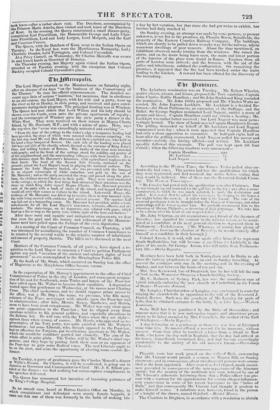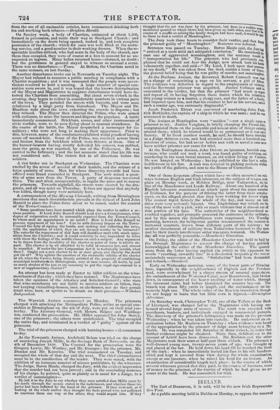Placards were last week posted on the walls of !lath.
announcing that Mr. Vincent would preach a sermon on Beacon Hill, on Sunday afternoon ; and in consequence, about two thousand persons were assem- bled at the hour appointed. After some time had elapsed, nuch uneasi- ness prevailed in consequence of the non-appearance of the itinerant orator but the anxiety of the multitude was soon relieved by one of Mr. Vincent's adherents inthrming them that a Police-officer was pre- sent with a warrant for his apprehension for certain alleged inflamma- tory ex plass:isms in olline or his rOCCilt barangill',■ to the " ladies of Bath,- mei that consequently Mr. 'Vincent had thonght it prudent to make himself scarce. A substitute was, however, found in the person of a knight of the shears, named Gaisford.—Brisia Mirror.
The Chartists in Brighton, in accordance with a resolution to abstain
from the use of all exeiseable articles, have commenced drinking herb tea and smoking herb tobacco.—Brighton Herald.
On Sunday week, a body of Chartists, estimated at about 1,500, formed in procession, and made their way to Stockport Church ; and immediately on the doors being opened, rushed in, and took complete possession of the church; which for once was well filled at the morn- ing service, and a good number in their working dresses. When the re- spectable families arrived, who bad seats in the body of the church, saw them thus occupied, they were of course at a loss to account for so un- expected an ingress. Many ladies returned home—alarmed, no doubt ; but the gentlemen in general stayed to witness so unusual a scene. There was no disturbance.—Times. At Bolton, the Chartists acted in the same manner, on last Sunday.
Another disturbance broke out in Newcastle on Tuesday night. The Mayor had refused to summon a public meeting in compliance with a Chartist requisition ; and it was rumoured that the people were never- theless resolved to hold a meeting. A large number of special con- stables were sworn in, and it was hoped that the known determination of the Mayor and Magistrates to suppress disturbances would have de- terred the Chartists from assembling. But about seven o'clock in the evening, they began to collect in considerable numbers in various parts of the town. They paraded the streets with banners, and were soon reinforced by a large party from Gateshead. The Mayor and Dr. Readlam rode about the town exhorting the crowds to disperse ; but they refused. The Mayor then directed the Police, who were armed with cutlasses, to seize the banners and disperse the populace. A battle immediately commenced. Brickbats, stones, and other instruments of civic warfare, were to be seen flying about in unusual abundance. In the course of the battle, the Mayor despatched a messenger for the military ; who were not long in making their appearance. Prior to this, however, many of the combatants exhibited woful proofs of having come off second-best. Some of the Police, too, received severe blows and bruises from the brickbats which were thrown at them. One of the banner-bearers having stoutly defended his colours, was stabbed, near the groin, as was reported, by one of the Policemen. He was carried to the Infirmary ; and the last accounts stated that his life was not considered safe. The rioters fled in all directions belbre the soldiers.
A riot broke out in Stockport on Wednesday. The Chartists were excited by the arrest of several of their leaders, and the seizure of a large quantity of arms. Men for whose discovery rewards had been offered were found concealed in Stockport. The mob seized a quan- tity of arms sent from the Tower. A party of dragoons recovered them. The mob tried, unsuccessfully, to regain the arms and to rescue the prisoners. Towards nightfall, the streets were cleared by the dra- goons, and all was quiet on Thursday. It does not appear that anybody was killed, though many were seriously hurt.
A correspondent of the Morning Chronicle, writing from Birmingham mentions that much dissatisfaction prevails at the refusal of Lord John Russell to place the Police force about to be raised, under the control of the Town-Council- " Some questions have been mooted which place the matter in rather a se- rious position. If Lord John Russell should send down a Commissioner, what degree of cooperation could be reasonably expected from the Town-Council, to whom such an appointment is an insult ? How is Lord John Russell to procure repayment of his loan ? Can lie with decency impose on the Town- Council the duty of signing the bonds, and making and collecting the rates, with the application of which they arc not deemed worthy to be intrusted? The rates for the repayment of this loan will doubtless meet with much oppo- sition from the Chartists ; and it would certainly be very imprudent to lutist with them the feelings of the middle classes on such a subject. Any argument to be drawn from the invalidity of the charter in point of form is utterly ab- surd. The charter is by all Amitted to be valid at commotion law, and cannot be annulled. if under the late Corporation Act it is technically invalid, what then? Ought not a new charter to be at once given, and thereby the doubt got rid of? Why agitate the question of the statutable validity of the charter at all, when the Crown, being already satisfied of the propriety of establishing, municipal institutions in Birmingham, may at once remove all doubt, by just as many strokes of the pen as are necessary to put the royal sign-manual to a new or supplementary charter ?"
An attempt has been made at Exeter to billet soldiers on the wine- merchants of that city ; which they have resisted. The Magistrates have taken the opinions of the Attorney and Solicitor-General; who state that wine-merchants are not liable to receive soldiers on billets, they not keeping victualling-houses, inns, or ale-houses, nor do they permit retail wine, beer, or spirits to be drunk on their premises.— Wiltshire Independent.



























 Previous page
Previous page